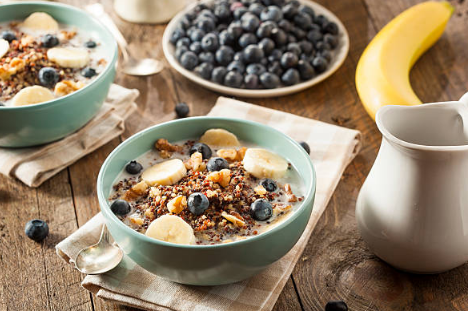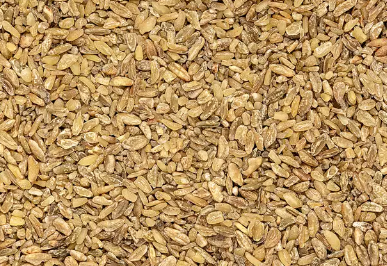Whole grains contain all three parts of the grain kernel: the bran, germ, and endosperm.
Compared to refined grains (which have the bran and germ removed), whole grains are richer in fiber, protein, and various vitamins and minerals.
Because whole grains are high in fiber and protein—two nutrients that help keep you full—they can be a great addition to a weight-loss-friendly diet.
1. Steel-Cut Oats
Steel-cut oats have more fiber and protein than rolled oats, making them a better option for weight loss.
These nutrients help slow digestion and increase feelings of fullness after eating, which may help reduce overall calorie intake.
Just 1/4 cup of steel-cut oats contains 4 grams of fiber and 5 grams of protein—about twice as much as the same amount of rolled oats.
2. Buckwheat
Though technically a seed, buckwheat is prepared and eaten like a grain.
It’s naturally gluten-free and packed with fiber and protein, offering about 4.5g of fiber and 5.7g of protein per cooked cup.
Buckwheat also delivers anti-inflammatory compounds like flavonoids, as well as magnesium and potassium.
3. Quinoa
Quinoa is a protein-rich pseudo-grain. One cooked cup contains 8g of protein and 5.2g of fiber.
This high-protein, plant-based carbohydrate is filling and supports weight control.
It’s gluten-free and rich in folate, magnesium, zinc, and iron.
4. Brown Rice
Brown rice has more fiber and protein than white rice. One cup of brown rice offers twice the fiber and 28% more protein than white rice.
Studies suggest brown rice is more effective at lowering body weight, BMI, and waist circumference compared to white rice.
5. Amaranth
Amaranth is a mild-tasting pseudo-grain with 9.4g of protein per cup.
High-protein grains like amaranth help you feel full longer and may help control calorie intake.
It’s also rich in fiber, magnesium, and iron—and may help manage cholesterol and blood sugar levels.
6. Sorghum
Sorghum is a gluten-free, nutrient-dense grain loaded with magnesium, B vitamins, and antioxidants.
A 1/4 cup of dry sorghum provides 9g of fiber—more than most grains.
Fiber supports digestive health and helps regulate appetite, which is crucial for healthy weight loss.
7. Teff
Teff is an ancient grain that ranks among the highest in protein content—one cup of cooked teff offers 9.75g of protein and 7g of fiber.
Its low glycemic index (~36.7) means it raises blood sugar more slowly than many other grains, making it a good choice for people with prediabetes or diabetes.
8. Freekeh
Freekeh is roasted young wheat, rich in both protein and fiber.
Just 1/4 cup provides 5g of protein and 4.5g of fiber, helping you feel full and satisfied.
It’s also high in antioxidants like flavonoids and phenolic compounds—twice as much as regular wheat.
Note: Freekeh contains gluten, so it’s not suitable for people with celiac disease or gluten sensitivity.
9. Farro
Farro is a chewy, nutty-flavored ancient grain. One cup contains 5g of protein and 4g of fiber.
It’s also a good source of iron and potassium. Farro works well in soups, salads, and stews.
It does contain gluten, so avoid it if you’re gluten intolerant.
10. Barley
Barley has a hearty texture and is high in fiber—with 6g per cooked cup.
It’s a nutritious source of complex carbs, plus selenium, iron, and B vitamins.
However, barley contains gluten and isn’t safe for those with gluten intolerance.
11. Bulgur
Bulgur is made from cracked wheat and provides 8.2g of fiber and 5.6g of protein per cup.
Its chewy texture and mild flavor make it a great whole grain base for mains and sides.
Like other wheat products, bulgur contains gluten.
How to Eat Whole Grains for Weight Loss
If you’re trying to lose weight, replace refined carbs like white bread and white rice with whole grains.
Whole grains are more filling due to their higher fiber and protein content.
Tips to include more whole grains in your meals:
-
Add cooked grains to high-fiber dishes like soups and salads.
-
Use whole grains as a simple side dish in place of refined grains.
-
Replace white rice with options like quinoa, bulgur, brown rice, or buckwheat.
-
Choose steel-cut oats instead of refined breakfast cereals.
If whole grains aren’t a big part of your diet yet, try experimenting with options like teff, sorghum, quinoa, buckwheat, and barley.
You may not love every variety, but you’re likely to find a few that work well for your taste and support your weight loss goals.


